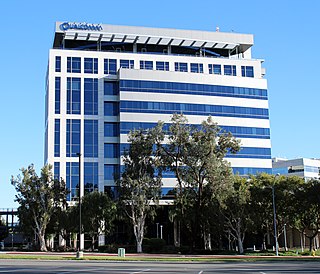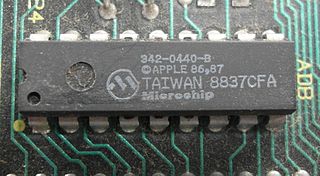Coleco Industries, Inc. was an American company founded in 1932 by Maurice Greenberg as The Connecticut Leather Company. It was a successful toy company in the 1980s, mass-producing versions of Cabbage Patch Kids dolls and its video game consoles, the Coleco Telstar dedicated consoles and ColecoVision. While the company disappeared in 1988 as a result of bankruptcy, the Coleco brand was revived in 2005, and remains active to this day.

Palm was a line of personal digital assistants (PDAs) and mobile phones developed by California-based Palm, Inc., originally called Palm Computing, Inc. Palm devices are often remembered as "the first wildly popular handheld computers," responsible for ushering in the smartphone era.

A parking meter is a device used to collect money in exchange for the right to park a vehicle in a particular place for a limited amount of time. Parking meters can be used by municipalities as a tool for enforcing their integrated on-street parking policy, usually related to their traffic and mobility management policies, but are also used for revenue.

Qualcomm is an American multinational corporation headquartered in San Diego, California, and incorporated in Delaware. It creates semiconductors, software, and services related to wireless technology. It owns patents critical to the 5G, 4G, CDMA2000, TD-SCDMA and WCDMA mobile communications standards.
Moleskine is an Italian manufacturer, papermaker and product designer founded in 1997 by Francesco Franceschi, based in Milan, Italy. It produces and designs luxury notebooks, as well as planners, sketchbooks, leather backpacks, holdalls, journals, wallets, various accessories, and stationery.

Jakks Pacific, Inc. is an American company that designs and markets toys and consumer products, with a range of products that feature numerous children's toy licenses. The company is named after its founder, Jack Friedman, who had previously founded LJN and THQ and presided over the company until retiring as CEO and chairman after March 31, 2010, a month before his death on 3 May, 2010.

Monster Inc. is an American company that manufactures and markets about 6,000 products, but is best known for audio and video cables. It also produces speakers, headphones, power strips, mobile accessories and audio devices for automobiles. The company was founded by an audiophile and engineer, Noel Lee, in 1979 by experimenting with different ways to build audio cables. It grew by doing demonstrations to convince the industry that audio cables made a difference in audio quality and by establishing relationships with retailers that were attracted to the cable's profit margins.
The Modo was a wireless device developed by Scout electromedia and was officially announced on August 28th, 2000. Utilizing pager networks, the device was designed to provide city-specific "lifestyle" content such as restaurant & bar reviews, movie listings, in addition to original Scout-produced content.

Martin "Marty" Cooper is an American engineer. He is a pioneer in the wireless communications industry, especially in radio spectrum management, with eleven patents in the field.

Microchip Technology Inc. is a publicly-listed American corporation that manufactures microcontroller, mixed-signal, analog and Flash-IP integrated circuits. Its products include microcontrollers, Serial EEPROM devices, Serial SRAM devices, embedded security devices, radio frequency (RF) devices, thermal, power and battery management analog devices, as well as linear, interface and wireless products.
AirMagnet was a Wi-Fi wireless network assurance company based in Sunnyvale, California. The firm was founded in 2001 by Dean T. Au, Chia-Chee Kuan and Miles Wu and shipped its first WLAN analyzer product in 2002. In August 2006, the company shipped the Vo-Fi Analyzer, the first voice-over-Wi-Fi analyzer that could be used on encrypted VoWLAN networks. It was backed by venture capital firms such as Intel Capital, Acer Technology Ventures and VenGlobal.
Semtech Corporation is a supplier of analog and mixed-signal semiconductors and advanced algorithms for consumer, enterprise computing, communications and industrial end-markets. It is based in Camarillo, Ventura County, Southern California. It was founded in 1960 in Newbury Park, California. It has 32 locations in 15 countries in North America, Europe, and Asia.
Trillium Digital Systems developed and licensed standards-based communications source code software to telecommunications equipment manufacturers for the wireless, broadband, Internet and telephone network infrastructure. Trillium was an early company to license source code. The Trillium Digital Systems business entity no longer exists, but the Trillium communications software is still developed and licensed. Trillium software is used in the network infrastructure as well as associated service platforms, clients and devices.

Fun Little Movies (FLM) is a production and distribution company of short films intended for the internet and mobile devices. It was founded in 1988 by Frank Chindamo, currently an Adjunct Professor at the University of Southern California. Based in Burbank, California, Fun Little Movies was the first U.S. company to produce comedic films for mobile phones worldwide. By the time the company was in development of Psyche 101 in 2004, they had already begun producing shorts promoting internet dating services. In 2007, ROK Entertainment bought controlling interest in FLM, although in 2008 ROK defaulted on their agreement.
Shockwave.com, or Shockwave, is an online and offline video games distributor and game portal. It is owned by Addicting Games, Inc., based in Los Angeles, California, United States. It was launched by Macromedia on August 2, 1999, to promote the company's Shockwave and Flash players, both used on the website. As of 2005, the website had 22 million users. By 2010, it hosted more than 400 games in a variety of genres.
Operation Cybersnare was a United States Secret Service operation in 1995 targeted at computer hackers.

Sol Republic, Inc. is an American privately held audio manufacturer based in Michigan. Founded in 2011 by Scott Hix, Seth Combs, and Kevin Lee, it was sold to HoMedics in late 2015 or early 2016.

Teletrac is a software as a service company headquartered in Southern California, with offices in the United Kingdom. It provides cloud-based GPS fleet tracking software and is a subsidiary of Vontier.

The PCradio was a notebook computer released by International Business Machines (IBM) in late 1991. Designed primarily for mobile workers such as service technicians, salespersons and public safety workers, the PCradio featured a ruggedized build with no internal hard disk drive and was optioned with either a cellular or ARDIS RF modem, in addition to a standard landline modem.










